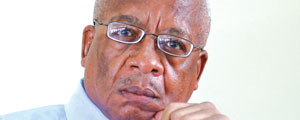
The just-ended scandal-filled 2012 Premier Soccer League season came to a head with the Asiagate match-fixing scam and Dynamos clinching the championship from Highlanders on mere goal difference.
Comment by Conway Tutani
Of course, some will say that the arbitration decision to award Dynamos the three points in the match against Hwange after the latter’s coaches were assaulted by Dynamos marshals was unfair and wrong while others will have a totally different view.
But what really shocked me was the tone of resentment, on the one side, and the sickening gloating, on the other, in the run-up to and aftermath of the decision.
This made my mind travel back to the first top-flight league match I watched as a young boy between Dynamos and the all-white Callies team in the late 1960s at Callies’ home ground in Eastlea.
For those 90 minutes on that Sunday afternoon, blacks from the townships and whites competed on equal terms in a white suburb in racist Rhodesia. After the match, the system of legalised racial segregation took over. So being at Callies was not only a social gathering, but a political event of sorts.
Football has this great effect on the politics or culture of a country.
From its formation, Dynamos came to represent or symbolise more than football prowess. It became a kind of community glue.
- Chamisa under fire over US$120K donation
- Mavhunga puts DeMbare into Chibuku quarterfinals
- Pension funds bet on Cabora Bassa oilfields
- Councils defy govt fire tender directive
Keep Reading
It became one of the many focal points of African nationalism. It provided a stage where blacks and whites played according to the same rules, unlike other spheres such as politics and at work where whites were openly and shamelessly favoured.
Pre-teen as I was then, murmurings of political awareness were stirred inside me. I noticed that the white man could be beaten at his own game — football.
Also that blacks could gather freely in stadiums during the duration of the match whereas open political meetings were prohibited in the townships especially after Zapu and Zanu were banned in 1964 and their leaders detained indefinitely.
Dynamos, at least in Salisbury (now Harare), eventually came to be called Timu yaMudhara (The Old Man’s Team), referring to detained nationalist leader Joshua Nkomo.
So it was also inevitable that on his release from prison in 1974, Nkomo would read the riot act to the then two biggest football teams in his home city of Bulawayo — Matabeleland Highlanders and Mashonaland United – ordering — not asking them — to change their tribally-derived names.
Nkomo had so much political authority and standing that the two teams promptly complied with Highlanders dropping the “Matabeleland” tag and Mashonaland United completely changing its name to Zimbabwe Saints.
Anyone who lived in Bulawayo during that time will tell you that every match day between the two teams would be preceded and followed by a low-intensity tribal war in the city.
I salute Nkomo for his political courage in largely succeeding to put a stop to this.
Saints have since fallen from the high league of Zimbabwean football and the most intense rivalry is now between Highlanders and Dynamos.
The politics of the country has vastly changed and — in tandem — football, being expressive of the current politics, now has new political symbols in this polarised nation still to face up to Gukurahundi and other excesses. Unfortunately, much of this is given tribal expression. Maybe that’s inevitable. Wrote blogger Dianne Stevens: “The emotions of football (most team sports, really) and war are group and tribe-based. They originate in the identity of the individual as it relates to the group.”
But some of this goes over the top as seen in a letter published in NewsDay last year in which the writer made a far-fetched link, saying that because Dynamos and Zanu (now Zanu PF) were formed in the same year — 1963 — they were one and the same thing. This was preposterous and facile. Or this shocking statement I heard in – of all places – a newsroom that “maNdevere adyiwa” (Ndebeles have been defeated) after Highlanders had lost. It’s not only intolerant, but primitive, to hold such views.
Don’t these morons on both sides realise that both clubs have had Ndebele and Shona players and have support across tribe? But people talk like this without real depth or knowledge of what they are really talking about.
We don’t want to get to the stage such as in Holland where Ajax fans call themselves “Jews”, and shout “We are Jews! Jews are champions!” — provoking Feyenoord fans so severely that they have to shout back: “Hamas! Hamas! Jews to the gas chamber!”, making the hissing sounds of escaping gas and the Hitler salute, imitating cruelly the Nazi massacre of six million Jews in Nazi concentration camps during the Second World War (1939-45).
Yes, football provides a release once a week where people — from presidents to peasants — go crazy and display their passion for the team they love, but this mustn’t go overboard to the extent of spewing paranoid and vile hatred against rival teams and fans. Hate cannot drive out hate.











